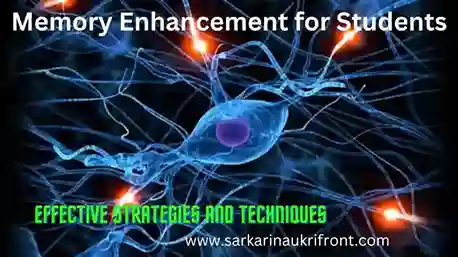Memory Enhancement for Students: Effective Strategies and Technique
Last Updated: 05/03/2024, 6:10:26 PM
Introduction
Memory Enhancement for Students: Effective Strategies and Technique. Memory enhancement is a critical skill for students aiming to excel academically. The ability to retain and recall information efficiently can make a significant difference in the learning process. In this comprehensive guide, we will explore various strategies and techniques that students can use to sharpen their memory skills and achieve better academic results.
Understanding Memory
Memory comes in different forms, including sensory memory, short-term memory, and long-term memory. To enhance your memory effectively, you should work on improving all these aspects. Here are some effective strategies to help you do that:
-
Stay Organized
Enhancing your memory begins with the crucial practice of staying organized. When you maintain a structured system to manage your commitments, such as assignments, class schedules, and key dates, you create a framework that supports memory consolidation and recall.
One effective method is utilizing digital calendar applications or physical planners to record and manage your tasks. By regularly updating these tools with upcoming deadlines and schedules, you establish a reliable reference point. This approach of Memory Enhancement for Students not only aids in time management but also keeps your mind uncluttered, allowing you to concentrate more effectively on learning and retaining new information.
The act of staying organized not only helps prioritize your responsibilities but also reduces mental strain, enabling your brain to optimize its capacity for memory retention. When you can focus on the task at hand without the distraction of trying to remember what’s due, you create an environment that is conducive to enhanced learning and improved memory performance.
-
Active Learning
Active learning is a dynamic approach that goes beyond passive absorption of information, involving active engagement with the material to enhance memory retention. Instead of simply receiving information, actively participate by asking questions, summarizing key points, and discussing topics with peers.
When you ask questions, you stimulate critical thinking and a deeper understanding of the subject matter. This process encourages your brain to actively process information, which enhances memory formation. Summarizing key points requires you to distill and articulate the most important concepts, reinforcing your grasp of the material.
Engaging in discussions with peers further solidifies learning. Explaining concepts to others and hearing different perspectives can strengthen neural connections related to the information, making it more likely to be retained in memory.
Overall, active learning techniques of Memory Enhancement for Students promote effective encoding of information into memory by encouraging mental involvement and interaction with the material. By adopting these strategies, you can significantly enhance your ability to remember and recall important information.
-
Effective Note-Taking
Effective note-taking is a fundamental strategy for improving memory retention and comprehension. Whether in lectures or while reading, the process of capturing organized and concise notes can significantly enhance your ability to remember key information.
-
Mnemonic Devices
-
Chunking
-
Spaced Repetition
-
Get Enough Sleep
-
Healthy Diet and Exercise
-
Mindfulness and Meditation
-
Stay Hydrated
-
Teach Others
-
Utilize Memory Techniques
Harnessing memory techniques like the Method of Loci (or “memory palace”) can be incredibly effective for memorizing lists, sequences, or other information.
The Method of Loci leverages the brain’s natural ability to remember spatial relationships. It involves associating each item you want to remember with a specific location or “place” within an imagined spatial layout, such as a familiar building or route. As you mentally navigate through this imagined space, you can recall the items based on their spatial associations.
Other memory techniques of memory enhancement, such as visualization, chunking, or mnemonic devices (like acronyms or rhymes), also capitalize on the brain’s capacity to create and recall associations. Visualization involves creating vivid mental images associated with the information you want to remember, while chunking breaks down complex information into smaller, more manageable chunks for easier recall.
By incorporating these memory techniques into your learning process, you can enhance memory retention and recall. Experiment with different techniques to find what works best for you based on your learning style and preferences. Consistent practice and application of these techniques can significantly improve your ability to remember and retain information effectively.
-
Practice Mindful Learning
-
Stay Curious
-
Use Technology Wisely
-
Practice Brain Games
-
Stay Social
-
Reduce Stress
-
Reward Yourself
Implementing positive reinforcement can serve as a powerful motivator to sustain your efforts in memory enhancement.
When you achieve learning goals or reach important milestones, take the time to reward yourself. Recognizing your accomplishments with treats, small indulgences, or relaxing breaks can reinforce positive behaviors and boost your overall motivation.
Choose rewards that are meaningful and enjoyable to you, such as treating yourself to a favorite snack, taking a leisurely walk, or engaging in a hobby you love. By associating these rewards with your memory-enhancing efforts, you create a positive feedback loop that encourages continued dedication to your learning goals.
Celebrating achievements not only boosts morale but also reinforces the neural pathways associated with successful learning and memory retention. This positive reinforcement helps maintain momentum and reinforces the value of your memory enhancement practices.
By integrating rewards into your learning journey, you can cultivate a sense of accomplishment and satisfaction, making the process of memory enhancement more enjoyable and sustainable over time. Choose rewards that resonate with you and use them as incentives to stay motivated and focused on your memory improvement goals.
Conclusion
Enhancing memory is a skill that can significantly improve your academic performance and overall cognitive abilities. By incorporating these strategies into your daily life, you can develop a robust memory that serves you well in your educational journey and beyond. Everyone’s memory is unique, so it’s essential to experiment with these techniques and adapt them to your learning style. With dedication and practice, you can unlock your memory’s full potential and achieve academic success.
You may also like;
Climate Change: Causes, Consequences, and Solutions


